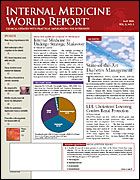Publication
Article
Unopposed Estrogen after Hysterectomy Does Not Increase Breast Cancer Risk: Back to Square One?
Author(s):
Long-term hormone replacement therapy (HRT) with unopposed estrogen does not appear to increase the risk of developing breast cancer and may actually protect against early-stage disease and ductal carcinomas. This finding is surprising, as it is a complete reversal of previous evidence, not an uncommon occurrence these days, it seems.
JAMA
A new study (. 2006;295:1647-1657) has revisited data from the Women’s Health Initiative (WHI) Estrogen-Alone trial, which was halted early because of a link between conjugated equine estrogen (CEE) and increased risk of stroke.
Preliminary data suggest that CEE may have reduced risk of breast cancer compared with placebo, a finding that runs counter to previous evidence from observational studies as well as from the other WHI trial, in which women with a uterus who were randomized to a combination of CEE and medroxyprogesterone acetate were found to be at a significantly higher risk of breast cancer.
In hopes of resolving these seemingly antithetical findings, Marcia L. Stefanick, PhD, of the Stanford Prevention Research Center, Stanford, Calif, and colleagues took a closer look at the 10,739 postmenopausal women (aged 59-79 years), all of whom had undergone hysterectomy, from the WHI Estrogen-Alone study who were randomized to 0.625 mg/day of CEE or placebo. All had mammography screenings at baseline and then annually.
P
After a mean treatment duration of just over 7 years, women taking CEE had a 0.80 hazard ratio for invasive breast cancer, a nonsignificant difference compared with those taking placebo. However, significantly more women in the CEE group had mammograms requiring follow-up over the course of the trial (36.2% vs 28.1%; <.001).
P
While acknowledging that subgroup analyses “require cautious interpretation,” investigators did find that CEE provided significant benefits to certain subgroups, including fewer ductal carcinomas (hazard ratio, 0.71) but not lobular tumors in all treated patients, and significantly fewer invasive breast cancers in women who adhered to therapy (hazard ratio, 0.67; = .03).
CEE also decreased risk of breast cancer in some low-risk women, such as those with no first-degree relatives with breast cancer and those without benign breast disease. Unopposed estrogen also benefitted women who did not have a history of HRT use when compared with those who used HRT before the study began.
The authors suggest that physicians can use their findings to help women decide whether HRT is right for them after hysterectomy.
KEY POINTS
Preliminary results from the WHI Estrogen-Alone trial suggest that CEE decreased risk of breast cancer in hysterectomized postmenopausal women.
This study found no effect on overall risk after an average of 7.1 years of treatment.
CEE increased the frequency of mammograms requiring follow-up, but women who adhered to therapy were less likely to develop invasive breast cancer.
CEE also reduced the risk of localized breast cancer and ductal carcinomas.






